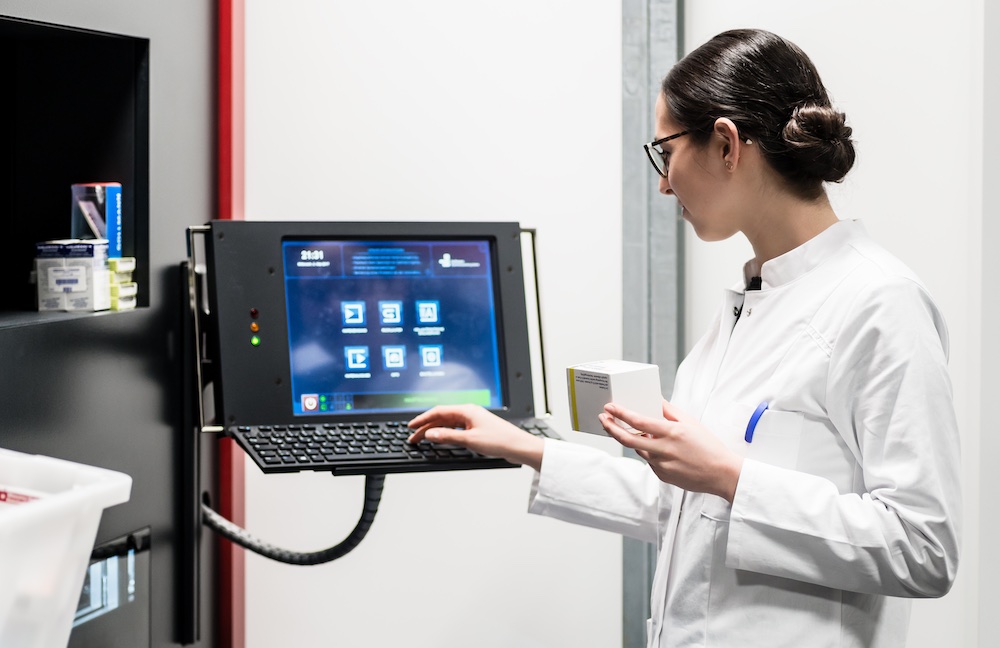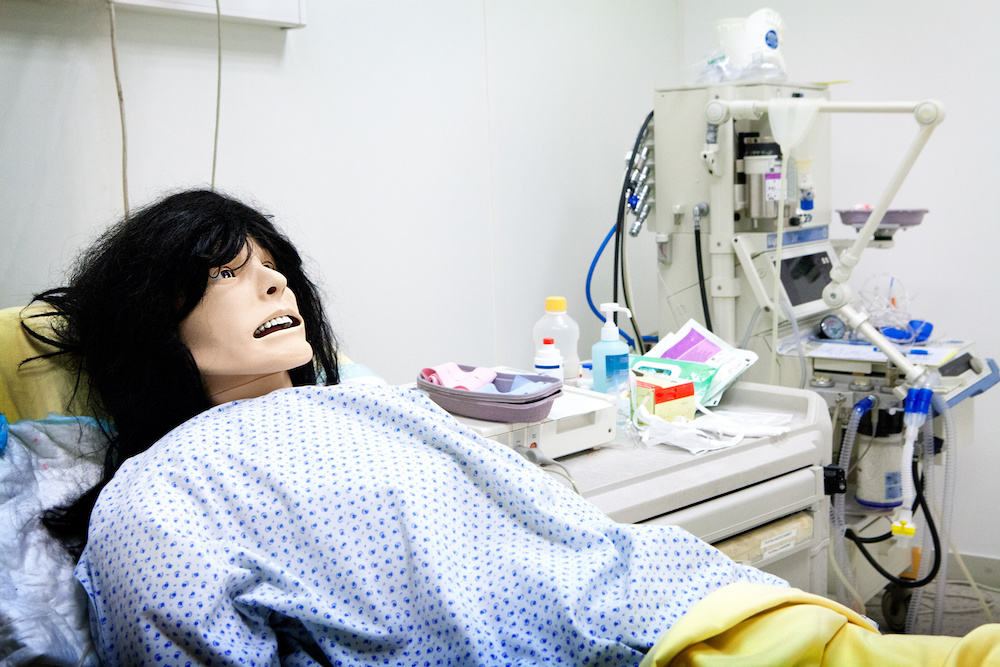A Healthcare Simulation Administrator is responsible for the administration, strategy, management, and leadership of a clinical simulation educational or training program. These professionals manage and oversee all aspects of staffing, create and oversee policies and procedures, liaison between all collaborative stakeholders, support training, educational, and research program development, as well as promote and represent the program. Continuing from HealthySimulation.com’s two previous articles How to Become a Healthcare Simulation Educator and How to Become a Simulation Nurse Educator, we interview Russell D. Metcalfe, FHEA, MSc, NRP, CHSE-A, a Healthcare Simulation Director practicing in Los Angeles at the Cedars-Sinai Women’s Guild Simulation Center about how to become a medical simulation program director.
Additional responsibilities of Healthcare Simulation Directors include overseeing the financial aspects of the program, technological advancement, adherence to accreditation standards and maximize the effectiveness of the connected simulation programs. Healthcare Simulation Directors may supervise or work alongside Healthcare Simulation Technology Specialists and Healthcare Simulation Educators.
“I am responsible for the development of simulation and strategy across Cedars-Sinai as a healthcare system. This gives me the overall direction to develop and implement strategy and make things happen operationally,” Russell D. Metcalfe, FHEA, MSc, NRP, CHSE-A, a Healthcare Simulation Director practicing in Los Angeles, said. “So I plan resources, equipment, purchasing and what technology we would want to choose to implement.”
He added that he believes his role to be absolutely rewarding, as the occupation is both managerial and hands-on. Metcalfe explained that as a clinician in a clinical role professionals are able to help one person at a time, however in this role he said he is able to help many others through the transfer of knowledge. Anyone preparing for a career in healthcare simulation administration must be prepared to: learn something new every day, be willing to wear many hats and help out with whatever is needed, and for facing new and unforeseen challenges every day.
View the HealthySimulation.com LEARN CE/CME Platform Webinar Introducing INACSL’s New Simulation Standard: Professional Development to learn more!
To gain employment as a Healthcare Simulation Director, these professionals should possess a Master’s Degree and ideally multiple years of related experience in either healthcare, technology, management, or education. Oftentimes, a Master’s Degree in a nursing-related field and a current Registered Nurse license are strongly preferred, however other areas of study may be suitable.
Also, a Certified Healthcare Simulation Educator (CHSE) certification provides a candidate with an overall advantage during the hiring process. For example, Metcalfe chose to complete a Master’s Degree in Medical Healthcare Simulation, and to also pursue becoming a Certified Healthcare Simulation Educator-Advanced (CHSE-A) and Certified Healthcare Simulation Operations Specialists (CHSOS). Learn about other careers in education and training.
“In my case, my Master’s Degree happened to be in simulation,” Metcalfe said. “My employers were ideally looking for a clinical background as well. I had previously held a role as the Head of Resuscitation Services at a hospital in the UK for 10 years.” While clinical backgrounds help, the primary responsibilities of the Director is to manage the program — and so health administration or business management experience is always a great fit.
Career Advancement
Within the field of simulation, Healthcare Simulation Directors can advance within their careers by obtaining additional certification (CHSE-A/CHSOS) or a license, keeping updated on best practices, networking with industry professionals for attending and presenting at educational workshops. They can also find opportunities to advance through participating in research projects/studies.
“Those wishing to advance in their careers as Healthcare Simulation Director’s may also wish to consider additionally pursuing a Doctorate in Education, or a similar doctoral degree,” Metcalfe said. “Simulation Directors never stop learning, developing and progressing somehow. For this reason, there’s lots of different certifications professionals may wish to pursue.”
He added that there are many shorter courses available to help professionals in this role increase their knowledge and awareness about the ever-advancing field of simulation. Metcalfe added that depending on a professional’s employer or the resources available, technical qualifications or training programs can also help a Simulation Director to advance.
“Every employer and their requirements and wishes are different,” he noted. There are a great many opportunities for advancement within this field as the need for simulation continues to expand while experienced workers currently open to hire remains rare.
Experience & Skills
In the role of a Healthcare Simulation Administrator, business management skills are critical, as is an advanced knowledge of training principles, content development, equipment, materials and methods. Additionally, these professionals should be familiar with managing purchase orders, status reports and front desk support.
“They should definitely have management skills, people skills and I would suggest a clinical background,” advised Metcalfe. “If these professionals want to help drive down the high averages in healthcare, they must ask themselves ‘How can we use simulation as a modality to help allow this to take place?’”. Understanding the objectives of healthcare education and training, financial circumstances and budget planning, as well as business experiences, like being able to pitch, are all crucial experiences for Simulation Directors.
They must also be fluent in Microsoft Office and web applications, as well as be comfortable learning how to operate software. Being able to maintain the utmost confidentiality is another skill required among Healthcare Simulation Administrators. Some employers will also request that Healthcare Simulation Directors possess fine motor skills (to set-up and use small, hand-held medical devices and supplies) and that they be able to bend, stoop, carry and lift objects up to 50 lbs — as again — sometimes even the Director needs to help set up for a complicated day of simulation activities.
Personality & Communication
“The ability to be collaborative is essential,” expressed Metcalfe. “Simulation Directors must be progressive and somebody who is constantly trying to develop and change things for the better. I don’t think their personality should entail somebody who is just happy with the status quo.”
To be successful in a career as a Healthcare Simulation Director, these professionals should also possess the ability to problem-solve, stay organized, implement best practices and create results-driven solutions. Additionally, they should be able to multitask, think critically and prioritize their daily tasks and responsibilities. Furthermore, these professionals should be comfortable working in a fast-paced environment and abiding by deadlines.
These individuals should also be able to remain calm in the face of daily unforeseen challenges. Starting or expanding a healthcare simulation program is very difficult as each institution has unique needs and funding, and almost everyone involved has to learn on-site together.
Lifestyle & Opportunities
Metcalfe explained that ultimately the lifestyle of a Simulation Director will depend on their employer. While most Healthcare Simulation Directors are employed full-time, part-time positions do exist.
“Everywhere has different resources available. At my previous job back in England, I was working very long hours, in some cases 60 to 70 hour weeks,” Metcalfe recalled. “This was because there was minimal staff. Where I work now, my employer is much better resourced, so we’re able to achieve what we need to achieve without having to work excessively long hours.”
He explained that working for a better resourced employer is very positive. However, Metcalfe explained that like most careers, that of a Simulation Director also has ups and downs.
“The career can be stressful, but the role can also be quite relaxing,” he said. “Once you put your systems in place, like your processors, the career is very much balanced. My personal opinion is that busy centers should employ a Simulation Director full-time.”
Some regional programs require Administrators to travel between locations to oversee multiple sites, but those remain less frequent still.
Employment & Demand
The majority of Healthcare Simulation Director positions result from a need established by colleges or universities largely to coordinate simulation requests and the facilitation of simulation sessions. Yet, position availability at a specific post-secondary education setting can be largely dependent upon the availability of funding. Also, hospitals and other healthcare facilities are known to employ Simulation Directors to evaluate applications and maintain records.
“To find employment, I would suggest taking a look at HealthySimulation.com’s career listing boards,” Metcalfe said. “There’s always new challenges, venues developing and bigger centers. So, there’s always opportunities to manage bigger services.”
HealthySimulation.com is the leading resource website for healthcare simulation news, resources, and global unique employment opportunities.
Earnings & Compensation
According to Metcalfe, there is significant earning potential in this career in healthcare. He explained that the more management experience a professional in this field obtains, the greater their salary range typically becomes.
“Like in any management or director role, many large institutions will follow the same salary scale,” Metcalfe explained. “To increase pay, Directors may considering becoming the Vice President of a center or managing multiple different centers. There’s always something to develop into, this just depends on what a professional wants to develop into and finding the role.”
Groups and Associations
Association for Simulated Practice in Healthcare (ASPiH) is a not-for-profit membership Association dedicated to improving patient care and professional performance by the use of simulated practice and technology enhanced learning.
INACSL, aka The International Nursing Association of Clinical Simulation & Learning, is a non-profit organization based out of the United States that provides simulation conferences and resources specifically towards Nursing. They have also developed the industries only Standards of Excellence for the use of simulation in healthcare.
Other more regional organizations exist outside the U.S. including the International Pediatric Society for Simulation (IPSS), Society in Europe for Simulation Applied to Medicine (SESAM), Dutch Society for Simulation in Healthcare (DSSH), The Gathering of Healthcare Simulation Technology Specialists (SimGHOSTS), Simulation Australasia (ASSH), The Society for Simulation in Healthcare (SSH), and more.
Healthcare Simulation Administrator Salary Range: $75,000 to $160,000
How Long To Become a Healthcare Simulation Administrator: 6 years
Healthcare Simulation Administrator Requirements: Master’s Degree in Business, Healthcare Administration, Healthcare or Technology
Additional Questions to Russell Metcalfe:
- What is the single biggest suggestion you would give to someone wanting to get into this career? “Don’t be afraid to take the leap into this career, as the possibilities for simulation are expanding.”
- What’s the number one mistake people make when trying to get into this career? “They don’t have enough experience. This is a mistake because the field is becoming extremely complex, and experience is necessary.”
- Do you believe simulation is making a difference in healthcare? “Clearly, yes! Simulation can impact the lives of so many people. My aim is to reduce adverse events and improve outcomes.”
- Why did you choose to embark on this career path? “I love the ability to engage people and share knowledge. I liked the idea of looking at new ways of achieving things, developing services, improving efficiency and outcomes and the patient experience. Certainly where I’m working now, every single path of the health system is involved in using the simulation management system.”
Learn More About Healthcare Simulation Career Opportunities!
*All statistics are provided by the Bureau of Labor Statistics.








